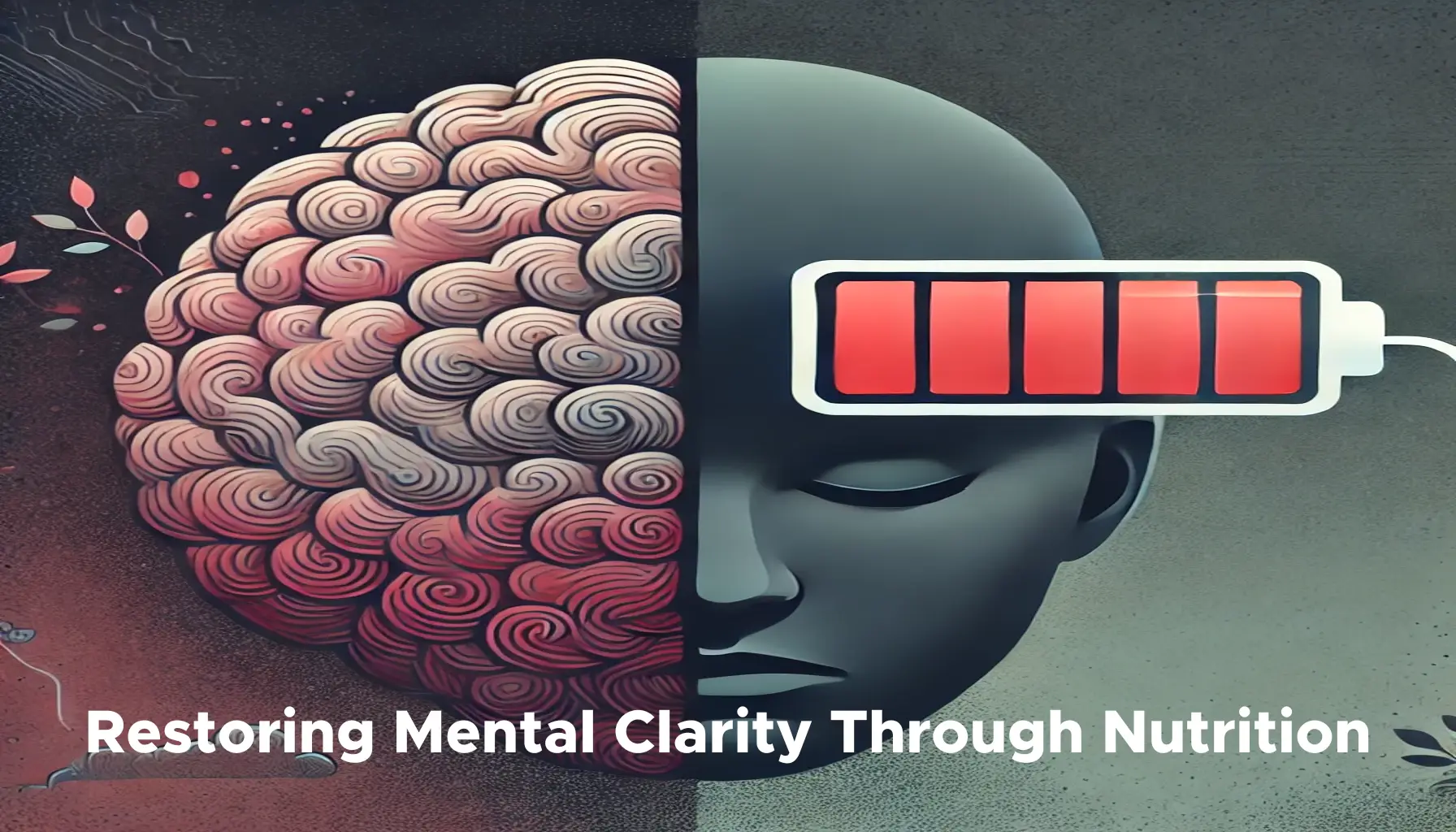Mental clarity is one of the first casualties of malnutrition, especially in those suffering from eating disorders like anorexia nervosa or orthorexia. If you’ve ever felt trapped in a fog, unable to make decisions, process emotions, or even recall simple information, you are not alone. These cognitive challenges stem directly from malnutrition, but the good news is that recovery is possible—starting with the right nutrition.
In this blog post, we’ll explore the science behind why malnutrition wreaks such havoc on your brain, how specific nutrients contribute to recovery, and what actionable steps you can take to restore mental clarity and cognitive function. From glucose deprivation to neurotransmitter dysfunction, we will cover the underlying processes that contribute to brain fog—and how refeeding can reverse them.
The Brain’s Energy Demands: Why Glucose Is Essential for Clarity
The brain is often described as an energy-hungry organ, and for good reason. Despite accounting for only 2% of the body’s weight, it consumes around 20% of your daily energy intake. Most of this energy comes from glucose, a simple sugar derived from carbohydrates. Without an adequate supply of glucose, brain function begins to decline rapidly.
What Happens When Glucose Levels Drop?
When you restrict food—especially carbohydrates—your brain doesn’t get the glucose it needs to function optimally. Neurons, the brain’s communication cells, rely on glucose to transmit signals. When glucose is scarce, neural communication slows down, leading to symptoms like:
- Slower cognitive processing: Tasks that were once easy, such as making decisions or solving problems, become overwhelming.
- Memory issues: Forgetfulness becomes more frequent, and it may feel like you can’t retain even short-term information.
- Mental exhaustion: Even with enough sleep, you may still feel mentally drained and unable to focus.
Actionable Insight #1: Reintroduce Carbohydrates to Replenish Brain Function
The quickest way to lift mental fog is by restoring glucose levels. Start by reintroducing simple carbohydrates such as bread, pasta, and even sugary snacks. While whole grains are generally recommended for long-term health, during the early stages of recovery, simple carbs are easier for your body to process and provide an immediate glucose boost.
- Nutritional Tip: Try adding a small carbohydrate-rich snack every few hours, like a piece of fruit or a granola bar, to prevent blood sugar dips and keep your brain functioning steadily throughout the day.
The Role of Neurotransmitters: How Malnutrition Disrupts Mood and Cognitive Function
Neurotransmitters are the brain’s chemical messengers. They regulate mood, focus, motivation, and emotional stability. When you restrict food intake, the production of neurotransmitters—especially serotonin, dopamine, and GABA—is severely impaired, which has a domino effect on cognitive and emotional health.
The Impact of Malnutrition on Key Neurotransmitters:
Serotonin: Known as the “feel-good” neurotransmitter, serotonin helps regulate mood, sleep, and appetite. Low serotonin levels are linked to increased anxiety, depression, and irritability. Inadequate nutrition, particularly a lack of tryptophan (a precursor to serotonin), hampers serotonin production.
Dopamine: This neurotransmitter governs the brain’s reward system. When dopamine levels are low, feelings of pleasure and motivation decrease. This can make the idea of nourishment feel punishing rather than rewarding, which is why so many people with eating disorders struggle to find joy in eating.
GABA: Gamma-Aminobutyric Acid (GABA) is responsible for calming the nervous system. Low levels of GABA contribute to heightened anxiety and difficulty in managing stress.
Actionable Insight #2: Increase Protein Intake to Boost Neurotransmitter Production
Neurotransmitters are built from amino acids, the building blocks of protein. Consuming protein-rich foods helps restore the neurotransmitter balance. Foods such as eggs, fish, chicken, tofu, and legumes are excellent sources of the amino acids needed to support serotonin, dopamine, and GABA production.
- Nutritional Tip: Aim for balanced meals that include protein, fat, and carbohydrates. For example, a meal of grilled chicken, brown rice, and avocado not only provides essential amino acids but also includes healthy fats for brain repair.
Cortisol and the Stress Response: How Restriction Triggers Chronic Stress
Cortisol, commonly referred to as the stress hormone, plays a significant role in your brain’s response to malnutrition. When you restrict food, your body perceives the lack of energy as a stressor and increases cortisol production. Prolonged high cortisol levels contribute to mental fatigue, anxiety, and emotional overwhelm.
The Long-Term Effects of Elevated Cortisol:
- Cognitive impairment: Chronically elevated cortisol levels are associated with reduced cognitive function, particularly in areas related to memory and learning.
- Emotional volatility: High cortisol makes emotional regulation more difficult, leading to increased irritability, mood swings, and feelings of being overwhelmed.
- Increased anxiety: High cortisol disrupts your brain’s ability to calm itself, perpetuating cycles of fear and anxiety—particularly around food and weight gain.
Actionable Insight #3: Eat Consistently to Lower Cortisol
Regular eating patterns help regulate cortisol levels and reduce the body’s perception of stress. The aim is to tell your brain that food is no longer scarce, and the body can start to relax out of its fight-or-flight mode. Frequent meals and snacks will stabilize blood sugar and prevent cortisol spikes.
- Nutritional Tip: Try eating every 2-3 hours, focusing on a balance of carbs, fats, and proteins in each meal. Snacks like yogurt with granola or peanut butter on toast can help sustain energy levels and keep cortisol at bay.
Structural Changes in the Brain: Reversing the Effects of Malnutrition
One of the most startling effects of prolonged malnutrition is its impact on brain structure. Studies show that malnutrition can lead to a reduction in gray matter, the part of the brain responsible for muscle control, memory, emotions, and decision-making. Severe restriction can also shrink the hippocampus, which is essential for memory and learning.
Can the Brain Recover from Structural Damage?
Yes—though the extent of recovery depends on the severity and duration of malnutrition. The brain has an incredible capacity for neuroplasticity, meaning it can adapt and regrow connections with proper nourishment.
Actionable Insight #4: Focus on Healthy Fats to Repair Brain Structure
Healthy fats, especially those rich in omega-3 fatty acids, are critical for rebuilding cell membranes and restoring gray matter in the brain. Omega-3s support neuron repair and enhance cognitive function, improving memory and emotional regulation over time.
- Nutritional Tip: Include fatty fish like salmon, walnuts, flaxseeds, and chia seeds in your diet. These foods help repair brain tissue and restore cognitive clarity. If you don’t consume fish, consider omega-3 supplements after consulting with a healthcare provider.
Rebuilding Cognitive Function: How Nutritional Rehabilitation Restores Mental Clarity
As you begin to nourish your body properly, cognitive clarity gradually returns. This process doesn’t happen overnight, but the benefits compound as your body continues to heal. Here’s what happens during the refeeding process:
- Glucose Replenishment: Carbohydrates restore glucose levels, allowing neurons to communicate effectively again. Decision-making, memory, and focus all begin to improve.
- Neurotransmitter Production: With sufficient proteins and fats, your brain can start producing neurotransmitters like serotonin and dopamine again, leading to better mood regulation and a return of feelings of pleasure and motivation.
- Cortisol Reduction: Consistent eating lowers cortisol levels, helping you feel calmer and more emotionally balanced.
- Brain Repair: With an adequate intake of omega-3s and other healthy fats, the brain begins to repair itself at a structural level. Gray matter regeneration supports better cognitive function, memory retention, and emotional stability.
Actionable Insight #5: Track Your Cognitive Progress with Journaling
Journaling is a powerful tool to document the gradual improvements in your cognitive and emotional health. Writing down your experiences can help you recognize patterns and see how your mental clarity is improving over time. Use prompts such as:
- “What changes have I noticed in my thinking since starting nutritional rehabilitation?”
- “How has my emotional regulation improved over the past week?”
Rebuilding Trust with Your Body: A Crucial Aspect of Recovery
For many people in recovery, the relationship with their body can feel fraught with distrust. Years of restriction may have created a mindset that views hunger cues as dangerous or untrustworthy. However, as you continue to nourish yourself, your body begins to trust you again—and you learn to trust it in return.
Actionable Insight #6: Use Mantras to Reinforce Body Trust
Mantras are a simple yet effective way to reframe your mindset during recovery. Positive affirmations can help you focus on the healing process and remind you that nourishment is not something to fear. Try repeating these mantras daily:
- “I am learning to trust my body.”
- “My body knows what it needs.”
- “I am healing one bite at a time.”
Foods to Focus On: Practical Tips for Rebuilding Brain Health
While all foods play a role in recovery, certain nutrients are particularly helpful for brain health:
- Carbohydrates: Choose simple carbs like fruits, breads, and pasta to quickly replenish glucose stores.
- Fats: Opt for healthy fats like avocados, olive oil, nuts, seeds, and fatty fish to repair brain cells and support neurotransmitter function.
- Proteins: Include protein sources like eggs, poultry, legumes, and dairy to provide the amino acids needed for neurotransmitter production.
- Vitamins and Minerals: Focus on foods rich in B vitamins, zinc, magnesium, and iron to support overall brain health and cognitive recovery.
I recorded this podcast especially on this subject. Have a listen by clicking the image.
Wrapping Up: Healing the Mind by Healing the Body
Restoring mental clarity through nutrition is not just about fueling your body—it’s about healing your brain. The effects of malnutrition are reversible with consistent nourishment, and as your brain receives the nutrients it needs, you’ll find that mental fog, emotional chaos, and cognitive decline all begin to lift. This healing process allows you to engage more fully in recovery, rebuilding trust with your body and reclaiming your mental clarity. Recovery is a journey, but with every meal, you are taking steps toward a clearer, healthier mind.
In my Gold Standard 1:1 Coaching, I help clients uncover the root causes of their anorexia. Together, we address both the trauma and the eating disorder, creating a path toward lasting recovery. We work on rebuilding interoceptive awareness, emotional resilience, and a compassionate relationship with food and the body.
You can also sign up for my Daily Love email series, in which I sed you a daily mantra or affirmation. These mantras help ground you in your recovery journey and provide daily encouragement. You can also follow me on Instagram @juliatrehane for recovery tips and inspiration.
Next Steps
If this blog resonated with you, take the next step toward freedom—I’m here to help you. For my gold standard 1:1 coaching, reach out to me here:
I also offer lots of free resources: sign up to receive daily mantras and my free recovery guide when you join my email community. You can do this here.
Follow me on Instagram for lots of helpful tips @juliatrehane.


